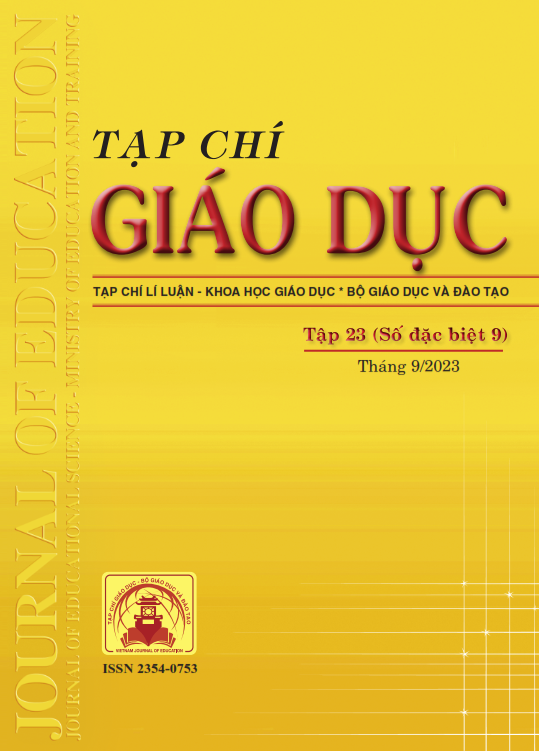Kinh nghiệm xây dựng bộ tiêu chí và quy tắc ứng xử trong dạy học trực tuyến cấp trung học phổ thông tại một số nước trên thế giới và khuyến nghị đối với Việt Nam
Tóm tắt
In the digital age, online education has become an integral part of the global education system. In order for teaching in virtual space to remain effective in terms of knowledge and preserve human values and cultural standards, it is necessary to introduce an appropriate code of conduct in online teaching. Recognizing this, many countries worldwide have issued behavior criteria and conduct codes suitable for their cultural and educational philosophies. This article presents the research results on behavior criteria and rules in online education from various countries. From these findings, recommendations are made for constructing a cultural conduct framework for online teaching for high school teachers and students in Vietnam.
Tài liệu tham khảo
Aotearoa New Zealand Code of Practice for Online Safety and Harms (2021). https://netsafe.org.nz/wp-content/uploads/2021/12/Aotearoa-New-Zealand-Code-of-Practice-for-Online-Safety-and-Harms-public-feedback-draft.pdf
Bộ GD-ĐT (2020). Công văn số 1061/BGDĐT-GDTrH ngày 25/3/2020 hướng dẫn dạy học qua Internet, trên truyền hình đối với cơ sở giáo dục phổ thông, cơ sở giáo dục thường xuyên trong thời gian học sinh nghỉ học ở trường vì Covid-19 năm học 2019-2020.
Bộ GD-ĐT (2021). Thông tư số 09/2021/TT-BGDĐT 30/3/2021 quy định về quản lí và tổ chức dạy học trực tuyến trong cơ sở giáo dục phổ thông và cơ sở giáo dục thường xuyên.
Department for Education & UK Council for Internet Safety (2022). Online safety in schools and colleges: Questions from the Governing Board. https://www.gov.uk/government/publications/teaching-online-safety-in-schools/teaching-online-safety-in-schools
Department for Education (2023). Keeping children safe in education 2023 Statutory guidance for schools and colleges. https://www.gov.uk/government/publications/keeping-children-safe-in-education--2
Đỗ Long (2009). Tâm lí học với văn hóa ứng xử. NXB Văn hóa - Thông tin.
Hoàng Phê (chủ biên, 2006). Từ điển tiếng Việt. NXB Khoa học xã hội.
Lê Thị Bừng (2003). Tâm lí học ứng xử. NXB Giáo dục.
Phạm Thế Hùng (2013). Văn hóa ứng xử kĩ năng giao tiếp thành công. NXB Giao thông vận tải.
Rahayu, R. P. & Wirza, Y. (2020). Teachers’ Perception of Online Learning during Pandemic Covid-19. Pakistan Journal of Medical & Health Sciences, 15(12), 3498-3500.
Seifert, T. (2021). Students’ perceptions of online teaching and learning. Malaysian Online Journal of Educational Technology, 9(3), 1-12.
UNESSCO (2016). Codes of conduct. https://www.endvawnow.org/en/articles/1758-codes-of-conduct.html
Victoria Institute of Teaching (2023). The Victorian Teaching’s Profession - Code of Conduct. https://www.vit.vic.edu.au/sites/default/files/media/pdf/2023-06/Document_VIT_Code-of-Conduct.pdf
Võ Bá Đức (2015). Cẩm nang văn hóa ứng xử và giao tiếp công sở. NXB Văn hóa - Thông tin Thành phố Hồ Chí Minh.
Đã Xuất bản
Cách trích dẫn
Số
Chuyên mục
Giấy phép

Tác phẩm này được cấp phép theo Ghi nhận tác giả của Creative Commons Giấy phép quốc tế 4.0 .












